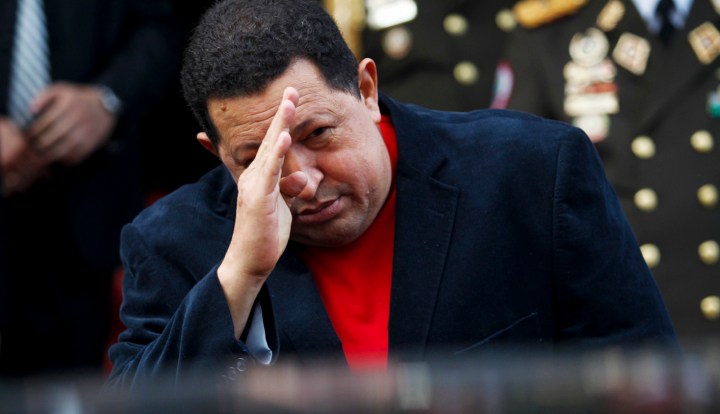Newsdeck
Venezuela’s Chavez heads to Cuba for medical treatment

Venezuelan President Hugo Chavez will travel to Cuba on Tuesday for medical treatment, following a nearly two-week absence from the public eye, months after undergoing cancer surgery on the communist-run island. By Brian Ellsworth and Deisy Buitrago.
Chavez, 58, staged what appeared to be a remarkable comeback from an undisclosed type of cancer diagnosed in June 2011. In October, he won re-election following a campaign that was much more subdued than his previous bids.
In a letter to Congress, Chavez said he would receive a form of therapy known as hyperbaric oxygenation, which is often used for the prevention and treatment of bone decay caused by radiation therapy, according to the American Cancer Society.
Chavez has not appeared in public in 12 days. The absence is unusual for a leader who routinely chats for hours during live broadcasts, and suggests his health has weakened since the campaign.
“Six months after I completed the last radiation therapy treatment, it has been recommended that I begin a special treatment consisting of various sessions of hyperbaric oxygenation,” Chavez wrote in the letter, which was read by congressional leader Diosdado Cabello.
“Together with physical therapy, (this) will consolidate the process of strengthening my health.”
The letter did not mention cancer.
Hyperbaric oxygenation therapy, also known as HBOT, involves breathing pure oxygen while in a pressurized chamber.
Chavez’s centralization of power and enormous control over the country’s oil revenue have made him the center of the OPEC nation that provides about 10 percent of U.S. crude imports.
If his health took a turn for the worse, his unwieldy coalition of military leaders and leftist social activists could fall apart. Investors hoping for a more market-friendly government tend to buy Venezuela’s highly traded bonds on reports his health is worsening.
The country’s benchmark Global 27 bond extended gains in the wake of the announcement.
CANCER STILL SECRET
Chavez’s refusal to disclose his actual condition has made his health the subject of constant speculation, particularly among opposition sympathizers who quietly hope he will take a turn for the worse. He defeated opposition challenger Henrique Capriles by 10 percentage points last month.
In late 2011, Chavez declared himself completely cured of cancer, but within months he had to return to Cuba to remove another tumor.
Some opponents of the president took to Twitter on Tuesday with jabs at the former soldier’s followers, repeating the message: “#FooledChavistas, you voted for Chavez! They made you believe he had been cured!”
But the usually feverish speculation has been muted by the approach of the holiday season and a general weariness with politics after a year of campaigning.
Doctors say a couple of years must pass without a recurrence before a patient is said to be cured.
In addition to the side effects of radiation therapy, experts say HBOT can be used to treat conditions including infections and decompression sickness, which can affect divers.
“It is a palliative treatment that is very common for cancer patients, and often lasts for several months,” said a Venezuelan medical source with knowledge of Chavez’s treatment.
Many Venezuelan doctors suspect Chavez used steroids and other treatments to look and feel fit during the election campaign. That can cause other health problems.
Chavez spent several months traveling back and forth to Cuba to receive treatment. The typically hermetic atmosphere there, and his friendship with former leader Fidel Castro, helped prevent details of his condition from leaking to the press.
Venezuela’s constitution says that if an incumbent leaves office in the first four years of a six-year term, a new election must be held.
Chavez’s treatment could make it difficult for him to help allies campaign ahead of Dec. 16 elections for state governors, which will be key to expanding his control over the provinces.
His allies, who run 15 of the country’s 22 states, have considerably less popular appeal than he does and can get a leg up in elections if Chavez joins them at rallies.
A prolonged absence could also slow the pace of key economic policy decisions, which often depend on his direct approval.
Most economists expect Venezuela will devalue its bolivar currency after heavy spending in the run-up to the October vote.
The currency has weakened sharply in the country’s black market for dollars in recent months. Greenbacks now trade at almost four times the official rate of 4.3 bolivars. DM
Photo: Venezuela’s President Hugo Chavez salutes Brazil’s Foreign Minister Antonio Patriota as he leaves in a car after their meeting at the Miraflores Palace in Caracas November 1, 2012. REUTERS/Carlos Garcia Rawlins



















 Become an Insider
Become an Insider